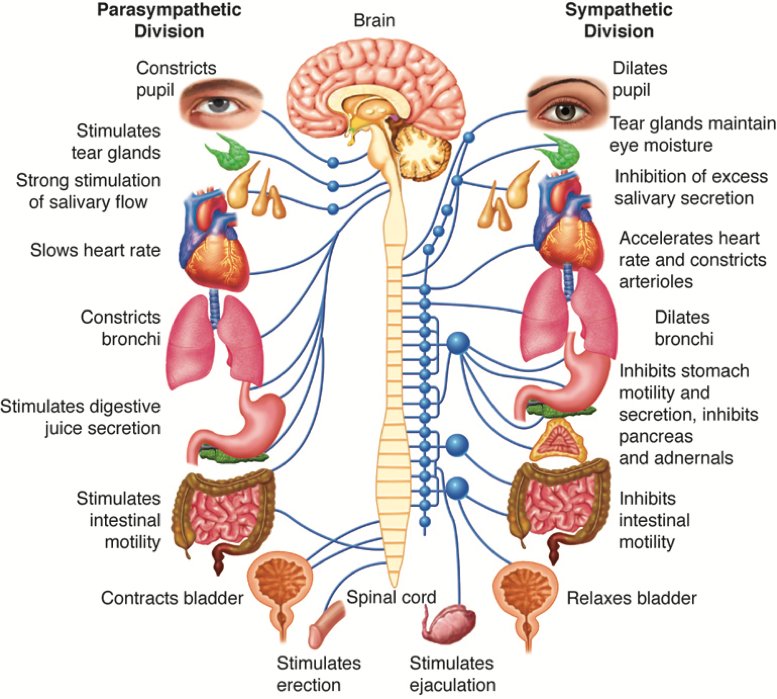Your autonomic nervous system controls involuntary actions, such as the beating of your heart, breathing, and the widening or narrowing of your blood vessels. When something goes wrong in the Autonomic Nervous System (ANS), it can cause serious problems with many body functions that should be automatic. We have represented many individuals with Autonomic dysfunction or Dysautonomia and have been successful in overturning their long term disability insurance denials. We’ve seen first-hand how debilitating ANS disorders can be.
The autonomic nervous system (ANS) has two main divisions:
- Sympathetic– The Sympathetic Nervous System prepares the body for stress or emergency situations—fight or flight
- And generally responds by stimulating body processes
- Parasympathetic – Controls body process during ordinary situations.
- And generally responds by inhibiting body processes
The autonomic nervous system controls involuntary body processes such as:
- Blood pressure
- Heart rate
- Breathing & swallowing
- Body temperature
- Digestion
- Metabolism (thus affecting body weight)
- Electrolyte balance (Minerals that balance the amount of water in the body)
- The production of body fluids (saliva, sweat, and tears)
- Urination
- Defecation
- Sexual response
Autonomic nervous system / ANS disorders can occur alone, or as the result of another disease, such as Parkinson’s disease or diabetes. When they affect your breathing or heart function, these disorders can be life-threatening.
Some autonomic nervous system disorders get better when an underlying disease is treated. Often, however, there is no cure. In that case, the goal of treatment is to improve symptoms.
Common symptoms of Autonomic Dysfunction or Dysautonomia
- Postural hypotension: lightheadedness, dizziness, fainting, dimness of vision, unsteady gait, weakness (POTS syndrome)
- Paresthesias: numbness or tingling in feet, legs, hands, arms or other body parts
- Urinary dysfunction: excessive, incontinence, retention, hesitancy
- Frequent Gastrointestinal dysfunction: intermittent diarrhea, constipation, nausea, vomiting, full-ness after eating very little, loss of appetite, slowing of gastric content, bloating, heartburn
- excessive or decreased sweating
- Sexual dysfunction: erectile dysfunction, vaginal dryness, decreased libido
- Exercise intolerance
- Bradycardia (Abnormally Low Heart Rate) or Tachycardia (Abnormally High Heart Rate)
- Extremely Low Blood Pressure
- Frequent Swings in Heart Rate or Blood Pressure
- Frequent Bouts of Dehydration
- Chronic Fatigue
- Heart Palpitations
- Dizziness or Vertigo
- Syncope (losing conciousness) or Near Syncope
- Difficulty Swallowing
- Chest Pain
- Shortness of Breath
- Frequent Migraines or Headaches
- Hypersensitivity to Light, Sound, Touch, or Smell
- Difficulty Regulating Temperature
Disability and AUTONOMIC DYSFUNCTION Or DYSAUTONOMIA
Autonomic dysfunction is the body’s over reaction or under reaction to stimulus. We had one client where getting up from a seated position and walking a few steps would make her heart rate elevate to 130 bpm (beats per minute). At other times getting up from sitting would make her heart rate drop to 40 bpm either.
How many jobs in America would allow for an employee with an ANS disorder like this to lay down/rest as often as necessary to recover from the exhaustion produced by simple movement? The answer is none!
One doctor described Autonomic dysfunction as: a failure of the body’s software. Regrettably, we cannot “reboot” a human being. There is no cure for autonomic dysfunction. Strategies for dealing with the underlying illness are helpful, but nothing is available to correct this devastating condition.
LTD Insurance claim denied?
If you have POTS, Dysautonomia,or other Autonomic dysfunction disorders and your disability claim has been denied, call us today for a free consultation.

